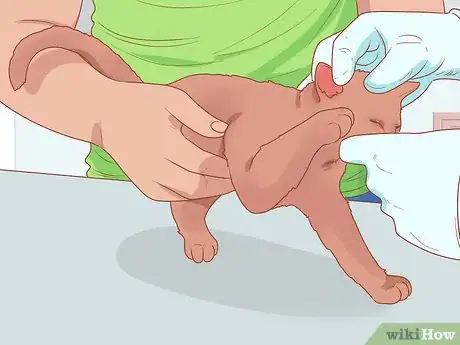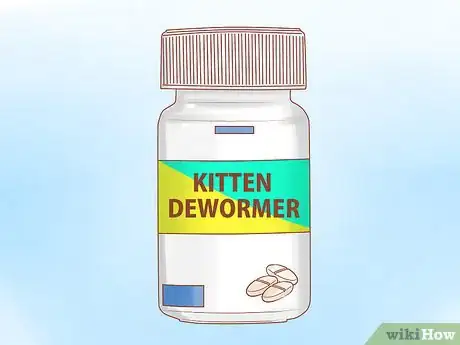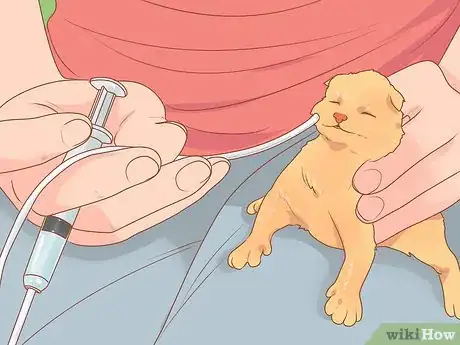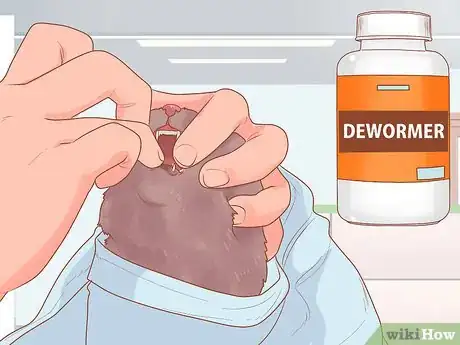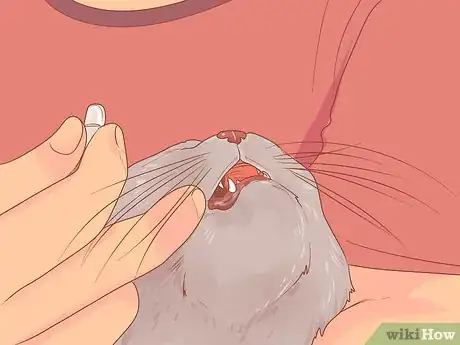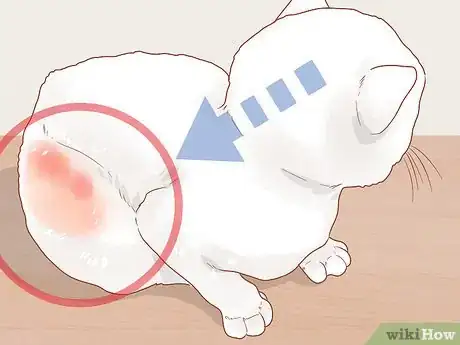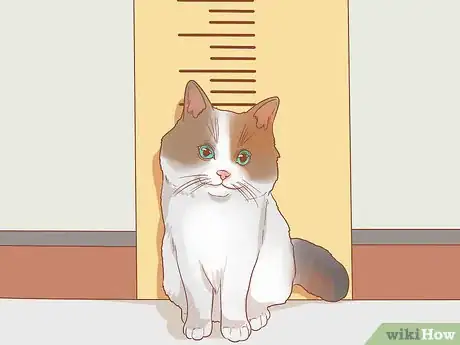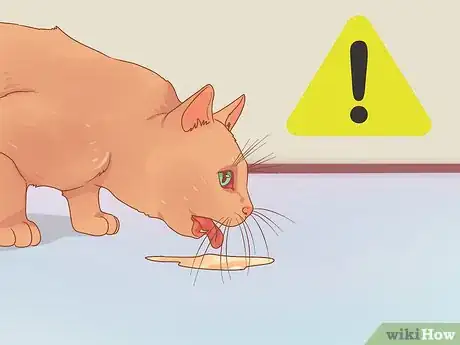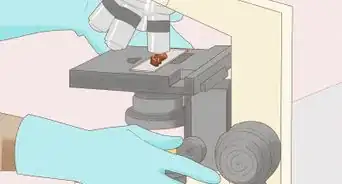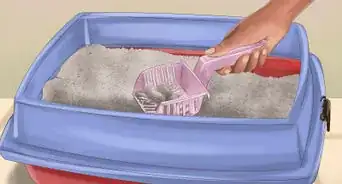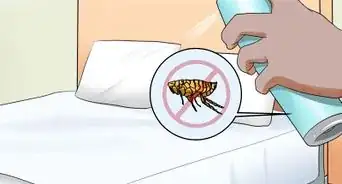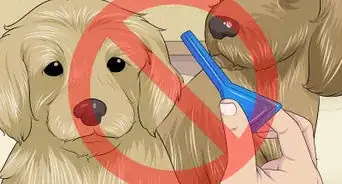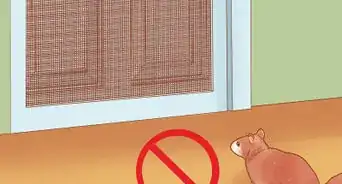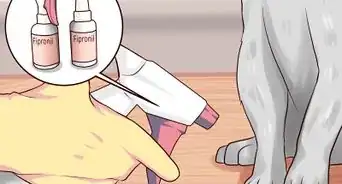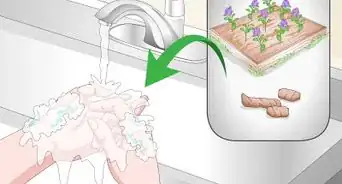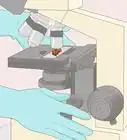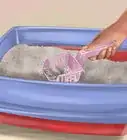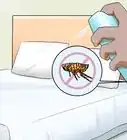This article was co-authored by Deanne Pawlisch, CVT, MA. Deanne Pawlisch is a Certified Veterinary Technician, who does corporate training for veterinary practices and has taught at the NAVTA-approved Veterinary Assistant Program at the Harper College in Illinois and in 2011 was elected to the board of the Veterinary Emergency and Critical Care Foundation. Deanne has been a Board Member of the Veterinary Emergency and Critical Care Foundation in San Antonio, Texas since 2011. She holds a BS in Anthropology from Loyola University and an MA in Anthropology from Northern Illinois University.
There are 7 references cited in this article, which can be found at the bottom of the page.
wikiHow marks an article as reader-approved once it receives enough positive feedback. In this case, 87% of readers who voted found the article helpful, earning it our reader-approved status.
This article has been viewed 96,562 times.
Kittens can be born with worms or get infected from their mother during their first few weeks. They most commonly get round and hookworms, but they can also get tapeworms, and two other parasites, coccidia and giardia. To deworm your kitten, follow the specific deworming schedule 4-6 weeks after birth and take the cat to the vet for a proper exam.
Steps
Eliminating Worms on a Treatment Schedule
-
1Take your kitten to the vet. The best way to deworm your kitten is to take them to the vet. Your vet will be able to diagnose the specific type of worm and give your kitten the proper treatment.[1]
- Even if you deworm your kittens at home to begin with, you need to take them to the vet by six months old to get a fecal test.
- If your kitten is still nursing from their mother, you should take the mother cat in to vet to get dewormed as well.
-
2Use a prescription dewormer. If you take your kitten to the vet, the vet will prescribe you a dewormer. The vet may also administer the dewormer for you. By taking your kitten to the vet, you know you are getting a dewormer that is approved for a kitten at the age yours is at. The form of the dewormer may depend on your cat's age.
- Prescription dewormers may come in chewable tablets, or as oral or topical solutions. Your kitten will eat the chewable tablet. A topical solution is a liquid that must be administered directly to the skin.
Advertisement -
3Get an over-the-counter kitten dewormer. If you want to deworm your kitten at home before taking them to the vet, you can buy a commercial dewormer. Look for products containing pyrantel pamoate, which will kill round and hookworms.[2]
- Only use over-the-counter dewormers that are labelled as safe for cats.
- You must look at the age restrictions on the dewormer to make sure the kitten is old enough. Some dewormers are for cats six weeks and up, while others may be nine weeks and up.
- Over-the-counter worm preventatives and treatments may come in liquid, tablets, or topical solution.
- A liquid solution is given orally, as are the tablets. Topical solutions are liquid solutions that are placed directly on the skin.
- No dewormer will get rid of all types of worms. While a commercial dewormer will get rid of most common types of worms, your kitten may still have worms that aren’t treated by the medicine. Take your cat to the vet as soon as you can to get a fecal exam, so they can be treated for the specific worms they carry.
-
4Start deworming kittens when they’re 3 weeks old. Most kittens are born with worms. Pregnant cats often pass worms that were dormant in their system to their kittens through the womb or after birth through milk. Because of this, start the deworming process at around two to four weeks of age.[3]
-
5Deworm your kittens every two weeks until the kittens are two months old. Start treatment when your kitten is 3 weeks old. Kittens needs to be dewormed often to get rid of all worms they may have. Kittens are also more susceptible to infestations, so deworming often helps combat that. Starting around two weeks of age, you should deworm your cat every two weeks for a total of four treatments.[4]
- This means you will give your kittens dewormers at two weeks, four weeks, six weeks, and eight weeks.
- Some vets suggest starting dewormers at three weeks and others four weeks. As long as you start the deworming process within two to four weeks, your kittens should be fine. If you are unsure when you should start the dewormer, contact your vet.
-
6Give the kittens dewormers once a month until six months old. After the last of the biweekly treatments, around eight weeks, you should give the kittens dewormers once a month until they are six months old. This means they will get a dewormer at 12, 16, 20, and 24 weeks.[5]
-
7Administer the last dewormer at twelve months. After you have given the kittens their weekly and then monthly doses, the treatment will be more spread out. Give them a final kitten dewormer at 12 months of age.[6]
- When the kitten turns one year old, you start deworming them as an adult.
Recognizing and Preventing Worms
-
1Look for a swollen abdomen. Kittens who have worms will have large, round, swollen tummies. This is different from the kittens gaining weight. The tummy will not match the rest of the body because the cat will not be gaining weight, despite an increase in appetite.
- The kitten may even lose weight.
-
2Notice any stunted growth. Kittens with worms will not grow at the normal rate. They won't gain the right amount of weight each week. Instead, they will be smaller and unhealthy looking.[7]
- Healthy kittens will gain weight as they grow. For example, by two weeks, they should be between eight to 14 ounces, and by four weeks they should be 12 ounces to 1.3 pounds. Healthy kittens will gain around 1.75 to 3.5 ounces each week.[8]
- This occurs because the worms are taking the nutrients that the kitten needs.
-
3Monitor for any digestive issues. Worms cause problems with a kitten’s digestive system. Worms may cause the kitten to lose their appetite or vomit. They also may have diarrhea, and sometimes it may be bloody.[9]
- Often, you will find worms in the vomit or feces, and you may even see worms around the anal area.
-
4Prevent worms by keeping your kitten indoors. The best way to prevent your kitten from getting infected with worms is to keep them indoors. Outdoor cats come into contact with all sorts of things that may transfer worms to them, such as contaminated feces, food, or animals.[10]
- This also helps protect them from ticks, fleas, and other parasites.
References
- ↑ https://icatcare.org/advice/worming-your-cat
- ↑ http://www.cat-health-guide.org/deworming-kittens-at-home.html
- ↑ http://www.revivalanimal.com/product/worming-schedule/
- ↑ http://www.revivalanimal.com/product/worming-schedule/
- ↑ http://www.petsandparasites.org/cat-owners/overview
- ↑ http://www.revivalanimal.com/product/worming-schedule/
- ↑ http://www.catsofaustralia.com/when_to_worm_your_kitten_or_cat.htm
- ↑ http://www.askthecatdoctor.com/kitten-weight-chart.html
- ↑ http://www.catsofaustralia.com/when_to_worm_your_kitten_or_cat.htm
About This Article
To deworm a kitten, try using an over-the-counter kitten dewormer that contains pyrantel pamoate, which will kill both round and hookworms. Just make sure that the dewormer is labeled safe for cats and that you check the age restrictions to make sure your kitten is old enough. Keep in mind that even after using an over-the-counter dewormer your kitten may still have worms, so it's important that you take it to the vet to get a fecal exam by the time it reaches six months old. To learn how to recognize and prevent worms in kittens, scroll down!
